Rachel Held Evans's Blog, page 46
March 19, 2013
"Today's Journey": Thoughts on Healing from Grace Biskie
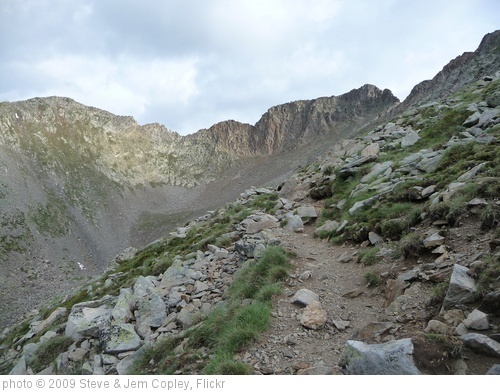
This is the third post of our weeklong series, Into the Light: A Series on Abuse and the Church, which
features the stories of abuse survivors, along with insights from professional
counselors, legal experts, and church leaders about how to better prepare
Christians to prevent and respond to abuse. (Previous posts include: The
Scar of Sexual Abuse by Mary DeMuth and No More Silence: An Interview with Boz
Tchividjian of G.R.A.C.E.) Through the course of the series, we will be
discussing child abuse, spiritual abuse, sexual violence and abuse, and
domestic violence. In addition, my friends Hannah, Joy, Shaney, and
Elora will be hosting a synchroblog focused specifically on spiritual abuse,
which you can learn more about here.
Today
we will be focusing on the winding road to healing. This morning’s post comes
to us from Grace Biskie. Grace is a
high-school-student-wrangler for a non-profit foundation, a speaker, and a
writer for Prodigal Magazine and A Deeper Story. Grace is working on her
first book, Detroit's
Daughter, a memoir about surviving her father, her brother, abuse, racism,
Christians, boys, and poverty, while growing up in Detroit. She is married to
Dave, and raising two handsome little Lego lovers, Ransom, 7, and Rhys, 3. She
loves photography, fashion & swiss cake rolls. She hates horcruxes and
human trafficking. You can follow her adventures in trying to lead a
purposeful, grace-filled, beautiful life on her blog, Gabbing With Grace,
or on Twitter.
Trigger
Warning: Sexual abuse by a father
***
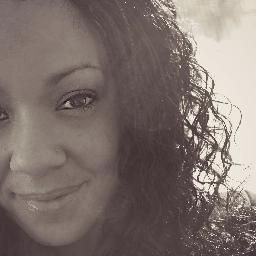
I
gave my life fully, completely to Jesus at 19. That same December I went
off to a large student conference where 500 of us gathered for a Hope &
Healing seminar for abuse victims. Since I knew Jesus now, I thought it
might be nice to explore the idea of how to help other women who had been through something similar. I, of course, had
no healing left to do, because I, Gracie Green had met Jesus in early April.
I
ended up hunched over on the floor, violently weeping, shaking uncontrollably
while my InterVarsity staff worker, York prayed over me and soon called
others over to help. Total train wreck.
Months
later, I began counseling to finally address the beast in my life: as a kid my
father had sexually abused me for several years. It took every ounce of
my emotional, spiritual and physical being to continue to address the abuse,
the consequences, the ramifications for three very long years. I
continued in counseling while I was violent with suicidal desires, deep in
depression, and addicted to shopping, masturbation, sleep and powdered
doughnuts, all the while my Ma became very ill and poverty had encroached it's
claws onto my bare back. I could barely move my neck. All that
grief rose up and landed right on my shoulders, a constant reminder that everything was painful, everything a
disgrace.
But,
Jesus...
From
the shame of the abuse, the shame of the depression (which was still largely a
stigma for me), the shame of the masturbation alone for crying out loud, I would
have buried myself and wrote "unworthy" on the tombstone if I could
have. None of that looked like healing. I often wondered, 'How the hell
is this healing? How am I anything remotely resembling God's
healing so full of mercy?'
What
I see now, I couldn't see then.
***
I
remember telling someone for the first time that I'd officially forgiven my
father. I was young. Seventh grade young. It had been less
than a year since I'd testified against my Dad & watched him carted off
to prison. I sat in a small group of six girls at Rhonda
Duke's pre-tween birthday party and told them what happened. To quote myself,
I said I was "like, sooo over it." Jodi Pennington looked at me
and said, "It's so awesome that you told someone and that you forgive
him!" I adored that gold star of affirmation.
wish I could scoop up that naive' little babygirl and tell her she don't know
the half.
The
thing is, that same thing kept happening. At fourteen, I started a
ridiculously unhealthy sexual relationship. Our tender ages should have
been indication enough there would be trouble, but once I'd chosen sex for
myself, I knew. I knew.
Something was very, very wrong about sex. Not only was it painful and
disgusting but that the act itself made me want to throw myself in front of the
closest moving vehicle. Like most teenaged girls, I assumed that the
something was wrong with me.
I was the unworthy slut who got what was coming to her.
Again with the naivete, I thought if I visited my Dad in prison I'd be better,
his repentance would soothe my problems away, but the the
visit left me in absolute ruins.
***
After
three years of married life, a Daddy-like dude came into my life which brought
every single Daddy issue I had right back up to surface level. I went to
a conference called "Guilt & Shame: Adult Survivors of Sexual
Abuse." Absolute hell on earth. It was misery. In my small
group were eight people in their 50's, 60's & 70's. The oldest member
was 87. We spent hours creating a Trauma Egg where we detailed every
trauma in our lives and each took an hour to share. Every member of my
group cried -some hysterically- through my egg presentation. It was their
feedback that popped on a bright light bulb for me: they were jealous, full of
holy envy that I had suffered the worst part of my healing journey while I was
young, before I was married and before I had kids to worry over. All but
one in our group of misfits hadn't lost their marriage over the consequences of
the abuse: me.
I
didn't realize at nineteen that I'd begun a long journey where often the first
leg is the worse. I imagine it's a lot like that first step in Alcoholics
Anonymous, just admitting the problem. I thought I was going in for the
recommended twelve weeks, and it continued to surprise me, month-after-month
for three years, that I was still in the thick of it.
***
I
had such a riot at the Guilt & Shame Conference, I signed up for more
counseling. Again. The Daddy-like dude issue only got worse.
The next year, my father died. My husband and I attended his funeral
because I wanted to tangibly extend grace –again—in a way I knew he couldn't
shit on, being dead and all. But I learned at the funeral that he'd told
his entire family that I'd lied about the abuse and that he was wrongfully
imprisoned. That was a blow. And it was back to counseling.
***
I
could go on with stories about this Daddy-like dude who I didn't end up
evicting from my life until nine months ago (I know, I know), or more of the shameful choices I've made (plenty), or more
of the counseling I've had (recently), or the weight these issues have put on
my marriage (almost to its demise), but you probably get the point by now:
healing, our healing, is a long journey like a trek up a steep, winding and
dangerous mountain.
For
this journey, you need camping gear. You need to stop and rest. You need
water because it's taxing and flashlights because it's dark. You need
correct expectations because no one climbs a strenuous mountain
unprepared. But most of all, you need to know that you won't see the
top, the very top until you pass from this life to the next. That
mountain top experience of 100% healing from abuse is not for us in this
not-yet-fully-here Kingdom of God in which we currently reside.
Call
me a Negative Nancy, but I'm looking to heaven for my complete healing. I
don't sugar coat, ya'll. My father broke my heart.
I decided to stop trying to fix what is irrevocably broken, my hope soared.
One
day I will see Him face to face, when all things will be made new for this
tattered heart of mine. Until then, I press on in my messy-as-hell
journey toward healing. Yes, this healing journey of mine has been as
FUGLY as the day is long, but I'm still on it. I've watched others get off and
shrivel into...well, a Jerry Springer episode.
The minute
you climb down, the minute you back out of active healing and forgiveness,
that's when you succumb. And as people so tightly held in God's hands, I
want to encourage you not to give up. Don't be discouraged when the coping
looks worse then a Housewives episode. This is not a one-stop shop.
This is not a pastor who pushes you over and claims, "HEALED, in name of
Jesus!" This is a less-than-reality-t.v.-worthy, day after day, messy journey
of faith draggin' its triflin' self back to the cross where Jesus offers peace
and blessing to the broken-hearted. I don't have a Dad, but peace and
blessing I have in abundance.
With
hope in Jesus, professional counseling, godly counsel, trusted books, anti-depressants,
accountability, repentance within loving community and regular workouts I'm
convinced every little thing is going to be alright...
...at
least for today's journey.
***
Be
sure to check out Grace’s blog. For
abuse survivors, Grace recommends The Wounded Heart: Hope for Adult Victims of
Childhood Sexual Abuse by Dr. Dan Allender.
For
additional information on how churches can prevent and respond to abuse, check
out yesterday’s interview with Boz Tchividjian.
Other
Resources:
The
Allender Center at the Seattle School
Diane
Langberg on The Spiritual Impact of Abuse
Diane
Langberg on Sexual Abuse Within Christian Organizations
Child
Sexual Abuse: Startling Statistics



March 18, 2013
The Scar of Sexual Abuse by Mary DeMuth
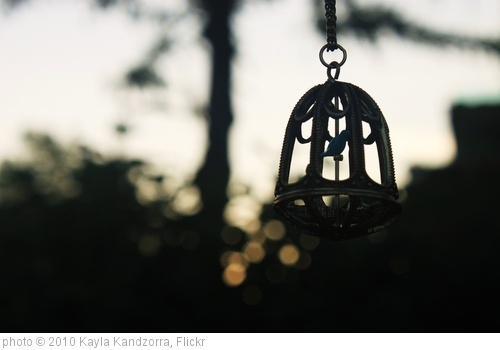
This is the first post of our weeklong series, Into the
Light: A Series on Abuse and the Church, which features the stories of abuse
survivors, along with insights from professional counselors, legal experts, and
church leaders about how to better prepare Christians to prevent and respond to
abuse.
T
hrough the course of the series, we will be discussing child abuse,
spiritual abuse, sexual violence and abuse, and domestic violence. Morning posts will feature a survivor story (today’s comes
from author Mary DeMuth), and afternoon posts will feature interviews and guest posts
from professional counselors, legal experts, and leaders (later today you will meet
Boz Tchividjian of Godly Response to Abuse in the Christian Environment--G.R.A.C.E). In addition, my friends Hannah, Joy, Shaney, and Elora will be
hosting a synchroblog focused specifically on spiritual abuse, which you can
learn more about here.
This morning's post comes to us from Mary DeMuth, a gifted author and all-around woman of valor, who blogs at http://www.marydemuth.com. Mary is
the author of over a dozen books including her memoir Thin Places,
which reveals her story of past neglect and abuse in raw clarity. She speaks
around the nation and the world about living an uncaged life. Her greatest
accomplishment? A dear, dear family in Texas—a husband of 22 years and three
nearly-grown children. In her spare time she gardens, runs, leads a high school
girls’ group, and cooks-cooks-cooks for family and friends.
Trigger Warning: memories of child sexual abuse
The Scar of Sexual Abuseby Mary DeMuth
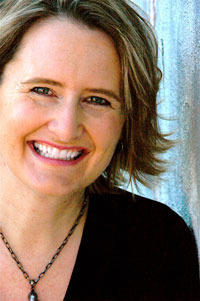
On a recent run, I watched as two young boys, maybe first graders, laboring up a hill with their scooters on the way to school. Smiles, wind, joy encircled the scene. But what made it even more sweet was this: a mom drove behind them, slower than slow, making sure they made it to school. They wanted adventure. She recognized that, but she also realized something important about this life: children need protection.
I tried not to cry at the scene. That is not my story. No parent following behind me, actively worrying about my well being. As an only child of a mom entangled in the hippie culture and a father already divorced, I walked, biked, skipped alone. You can find the entirety of my story in my memoir, Thin Places.
Here it is, told cinematically:
When I went to the babysitter's house at five, even she, Eva-the-chain-smoking-babysiter, did not protect me. The neighborhood boys, brothers, took me away from her, got me out of her wildly unkempt hair. Within eyeshot of the elementary school, in the incline of a wooded park, they violated me. Sexually assaulted me. Whispered threats. When I squirmed and cried and later resigned myself to their inevitable visits, they said they'd kill my parents if I told. I believed them. I obeyed and kept quiet.
Oh how what they did hurt. Stung. Ate at my insides. Burned. Their act emptied me of the little girl I've never fully recaptured, a carefree, dancing, joyful, sprite of a girl. My coping mechanism? Disconnecting. I remember staring up at those majestic evergreen trees, watching the limbs sway, begging for rescue, imagining myself a bird who could fly, fly away, nest in their motherly branches. As long as my mind disconnected into the trees, I could tolerate the boys.
Until they invited friends.
The passel of boys used a swear word to describe what they did to me. And I was scared to say that awful, awful word to my babysitter, fearing a trip to the bathroom, a bar of soap, and my open mouth. But the boys bringing their friends ignited my bravery. Smoke circling around her, I pulled Eva-the-chain-smoking-babysitter to me, whispered that awful word in her ear. She reeled heavenward, eyes wild. "I'll tell your mom," she said.
And I believed her.
But the boys came again. Knock, knock, knocked on the door to her home. And she, being the opposite of the mom who drove behind her scooter-happy kids, let them take me. And I thought (wrongly) that my mom knew but didn't care.
So I decided not one person on this evergreen-treed earth would protect me. Only I could.
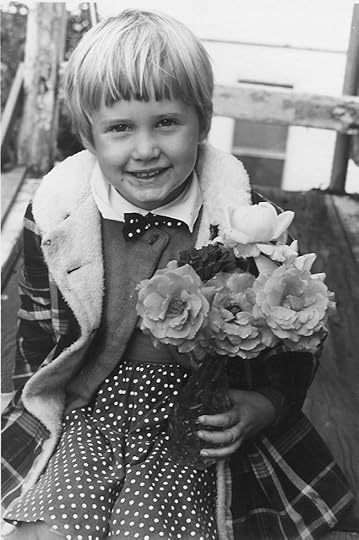
Here I am at five years old, so you can grasp some perspective.
That little pixie-cut girl learned how to sleep. And sleep. My sleeping prevented their excursions. And then relief: we moved away.
Problem was, the boys had done their damage. Their scarring remained.
They'd etched into my soul this indelible scar that blazed across my forehead for every. single. predator to view as a welcome sign for violation. (Have you ever felt this way?) Somehow the creeps of the world knew my secret, though I kept it locked it away. The ragged, scabbed scar was a beacon, blaring, and it had its best result when I lived unsupervised. Which was often.
A boy removed his pants in a playhouse, told me we would be playing doctor. I ran.
A hired hand stepped way too close. I could smell his adolescent breath. I ran.
An older brother of a girl I babysat approached me from behind, slid his hands on my shoulders, then southward. I had nowhere to run, but I found a way to put distance between us.
I'm scrappy that way. After all, only I could protect myself.
***
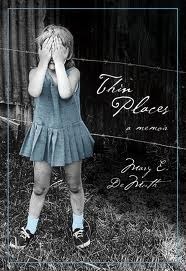
I met Jesus under an evergreen tree at fifteen. That familiar place of violation where I watched the tree limbs now became a sanctuary where I realized someone dared to love me enough to follow me wherever I walked.
Meeting Jesus gave me the bravery to share my story. Initially I wasn't believed. So I told again. And again. And again. Until I connected with people who loved me, who dared to believe God would heal broken, messy me.
The painful truth: We who are violated experience that violation in the context of sick community, but the way of healing always involves better community. The very thing that damages us is the place where God heals us. Which is why so few heal. Because why would we entrust ourselves to anyone after parents neglected, babysitters made evil choices, and boys ruined us?
The other painful truth: I would not have healed had I not told my story. Isolation creates a festering wound. An untold story never, ever heals. Keeping it in only explodes you in other ways. Addiction. Rage. Depression. Suicidal thoughts. Repeating the very thing you swore you'd never do. These actions come when we bottle up our stories. Because the stories come out, just not in our words.
I'd love to say I'm wholly healed. I'm not fully. I still struggle with sex, as I chronicled in "The Sexy Wife I Can't Be" in Deeper Story a few weeks back. Violators have spied my scar well into adulthood. I've had to be extremely cautious about who I entrust my heart to. Men still freak me out. Women too. So many issues. I grieve that I wasn't protected. I grieve my childhood (can I call it a childhood?).
I cannot yet reconcile a Sovereign God with unprotected me. While I rejoice that I've experienced a bucketload of healing, I still don't understand why God would allow such horror. If I knew about a child being abused, I would make sure it wouldn't happen. Why didn't God step in? (Of course I'm well aware of free will, but even knowing people can make evil choices doesn't negate the feeling I have that God could've done something sooner.) These are honest, honest questions, ones I probably won't know the answer to this side of eternity.
When I get mired in those questions, I think of the still-scarred hands of Jesus. He took on the haunting--mine, yours, ours. He felt every abuse, every bout of pornography, every hidden awful sexual sin, every person who trafficked another, every boy who violated a little girl under evergreens. He endured God-knows-what in the wilderness, plus what must've seemed like unconscionable neglect when His Father abandoned Him on the cross. He understands.
And yet, He wears the scars of bearing the sins of others for ETERNITY. Right now, He is reminded of every single heinous sin ever committed, simply by looking at His wrists.
I am scarred. I am not fully free. Even lately I wrote a letter to those boys who molested me, and tasted a bit more freedom.
In my journey of healing, those scars have taken on a sliver of beauty to me. They remind me of my utter need for Jesus. My abandonment and sexual abuse (and fatherlessness...my father died when I was ten) were the very things that flung me into His Almighty arms. My weakness is the dance floor He has used to do great things through me (to His glory). I have the privilege of speaking openly about this issue that most keep hidden (that is the grace of God), and pray for people, and see them taste freedom, too. What a privilege! We who are scarred have become the protector we never had.
As the (scarred) hands and (pierced) feet of Jesus on this earth with villains aplenty, we can serve as agents of healing, change, life, renewal and hope. We who were abused can now lend voices to those who can't speak. That's my prayer. That's my hope. I dare to believe you can heal. And that even in this space of the internets, we can learn to be brave and tell our stories, to cry alongside, to be good community for each other and usher in healing. We can drive our cars slow, protecting those who ride before us.
***
Be sure to check out Mary's beautiful book, Thin Places. She has also written about "10 Ways to Spot Spiritual Abuse" and "What to Do if You Are in a Spiritual Abusive Situation." She writes about domestic abuse in novel form in Life in Defiance.
Other resources recommended by Mary:
Phil Monroe
Dan Allender
And don't forget about the spiritual abuse awareness week synchroblog.
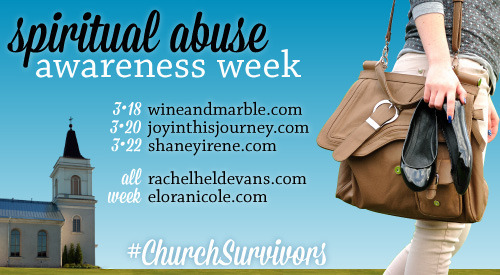
Art by http://dani-kelley.deviantart.com/gallery/



March 17, 2013
Sunday Superlatives 3/17/13
Prayer for the day: Christ with me,
Christ before me, Christ behind me, Christ in me,
Christ beneath me, Christ above me, Christ
on my right, Christ on my left, Christ when I lie down, Christ when I sit down, Christ
when I arise, Christ in the heart of everyone
who thinks of me, Christ in the mouth of everyone
who speaks of me, Christ in every eye
that sees me, Christ in every ear that
hears me. (St. Patrick’s Breastplate)
Funniest:
The Lutheran Satire with “St. Patrick’s Bad Analogies”
Wisest:
Lisa-Jo
Baker with “There is no such thing as perfect hospitality”
“If I wait for my house or my life to be perfect before ever
inviting someone into it, I just might never let anyone in.”
[Related: Henri Nouwen on hospitality]
Truest:
Ann Voskamp with “Letters to the Wounded #2”
“And maybe
our deafening silence is just this: Truth necessitates confrontation — and a
whole lot of us are more chicken than Christian. We’d rather
save our own skin, than the skin of the bruised and battered and beaten. We’re
more in love with self-preservation than with Savior-glorification. We’d rather make pain invisible than
say injustice is intolerable — so the injustice continues.”
Bravest:
Nate Pyle with “Confronting the Lie: God Won’t Give You More Than You Can
Handle”
“Ultimately, it isn’t about the questions. Behind the
questions is a deep current of emotion threatening to overtake us. But
too often, when the fracture in the universe threatens to swallow us up in pain
we fail to get fully present to our emotions. In those moments I think we
do one of two things. Either we ask the questions but never investigate
what emotion is driving those questions, or we resort to some banal Christian
slogan to try and make us feel better. This experience forced me to look at one
such statement that gets spouted often when people go through a lot: God
won’t give you more than you can handle. If I may be so bold, let’s
just call that what it is...
Most Intriguing:
Greg Boyd with “Getting Honest About the Dark Side of the
Bible”
“I only began to discern a way to understand how horrific
depictions of God in Scripture bear witness to the crucified Christ when I
finally stopped trying to deny these depictions were horrific. So long as we
try to tidy up, sanitize, minimize and piously gloss over material that we
honestly know in our hearts is macabre and revolting, the best case scenario is
that we will succeed at finding a slightly less revolting deity in these
portraits than we initially found. This is what standard evangelical apologetic
approaches accomplish, on a good day. It is in essence the approach I adopted
five years ago when I began this present project. But I came to see that even
the very best of these approaches are of no value when it comes to disclosing
how this material bears witness to the self-sacrificial, enemy-loving,
non-violent love of God on Calvary. And to make matters worse, all the while we
are tidying up our macabre depictions of God, we are bearing some
responsibility for the way this material continues to serve as a precedent for
people to appeal to in order to justify their hatred and violence, as it has
served throughout history.”
[I cannot WAIT to get
my hands on this book!]
Most Frustrating:
Samantha at Love, Joy Feminism highlights the multiple facepalm moments
in Mary Kassian and Nancy Leigh DeMoss’ interview at Focus on the
Family, including the accusation that egalitarian women are selfish, worldly women who despise children.
Most Stunning:
Smithsonian Magazine Photo Contest 2012 Finalists
Most Encouraging:
Sarah Kelm with “Eshet Chayil, or Getting Over My Arch-Nemesis”
“So don’t
be surprised if I call you out, if I proclaim “woman of valor!” to you
when you send me the spreadsheet I was looking for, or you share of a hard
conversation you had with your mother, or you run a 5K, or you tell me you and
your husband are going to try to have a baby. These are all things to be
celebrated, big and small. These are all things which deserve a hearty eshet
chayil. Instead of seeing fellow women as my rivals, as those who are
good in ways that I cannot be and who will steal the limited amounts of joy
this world contains, I want to see them as fellow women of valor,
women who inspire me and boost my own strength. I want to see them as women who
make me more brave by their own brave deeds.”
Most Helpful:
Joy Bennett at Alise Write’s place with “Sibling Rivalry”
“…We get so passionate about faith (or our
approach to the big questions, even if we don’t define it as faith per se)
because it’s such an integral part of who we are, how we think, and how we view
and interact with the world. I think we get so upset with our families over
faith disagreements because our families are so important to us. We want to
share this incredibly important thing to us with the people we love the most.
We want to be loved and accepted for who we are. When we disagree about those
things that are so much a part of who we are, when someone rejects our ideas,
it often feels like they also reject us.”
Most Eye-Opening:
Ethan Bronner at The New York Times with “Right to Lawyer Can Be Empty Promise
for Poor”
“Billy Jerome Presley spent 17 months in a Georgia jail
because he did not have $2,700 for a child support payment. He had no prior
jail record but also no lawyer. In Baltimore last fall, Carl Hymes, 21, was
arrested on charges of shining a laser into the eyes of a police officer. Bail
was set at $75,000. He had no arrest record but also no lawyer. In West Orange,
N.J., last summer, Walter Bloss, 89, was served with an eviction notice from
the rent-controlled apartment he had lived in for 43 years after a dispute with
his landlord. He had gone to court without a lawyer…”
Most Quotable:
Fred Clark with “It’s Not Your Stance, But Who You’re Standing With”
“Jesus did not say, ‘take this stance,’
but rather ‘Follow me.’ We’re supposed to be moving, not striking a pose."
Most Likely to Make You See it From a Different Angle:
Dan Pallotta via TED with “The way we think about charity is
dead wrong”
“People are weary of being asked to do the least they can possibly do…”
Most Likely to Relate to Previous Conversations:
The Atlantic with “Old Earth, Young Minds: Evangelical Homeschoolers Embrace
Evolution”
“Take Erinn Cameron Warton, an evangelical
Christian who homeschools her children. Warton, a scientist, says she was
horrified when she opened a homeschool science textbook and found a picture of
Adam and Eve putting a saddle on a dinosaur. "I nearly choked," says
the mother of three. "When researching homeschooling curricula, I found
that the majority of Christian homeschool textbooks are written from this
ridiculous perspective. Once I saw this, I vowed never to use them."
Instead, Warton has pulled together a curriculum inspired partly by homeschool
pioneer Susan Wise Bauer and partly by the Waldorf holistic educational
movement.”
[I know many of you have expressed
concern over a lack of faith-based curriculum that presents theistic evolution
as an option. I actually have several friends who have received grants from
BioLogos to work on science-friendly homeschool curriculum.]
Best Image:
“A photo that defines a generation”
Best Interview:
Naomi Klein at
Common Dreams with “Dancing the World Into Being: A Conversation with Idle No
More’s Leanne Simpson”
“The
alternative is deep reciprocity. It’s respect, it’s relationship, it’s responsibility,
and it’s local. If you’re forced to stay in your 50-mile radius, then you very
much are going to experience the impacts of extractivist behavior. The only way
you can shield yourself from that is when you get your food from around the
world or from someplace else. So the more distance and the more globalization
then the more shielded I am from the negative impacts of extractivist
behavior.”
Best Reflection:
NPR with “In St. Peter’s Square, History Unraveled Slowly”
Best Insight:
Zach Hoag with “SGM and
the Counseling Cliff”
“I have personal experience with this style of counseling at a
church I served in 7 years ago. It was one of the primary reasons my wife and I
finally decided to move on. One of the mainstays of this style is an antagonism
toward “secular” counseling or “modern” psychology, leading church movements
like SGM and Mars Hill Church in Seattle, for instance, to require members to
only receive counseling from their pastors. And, sometimes, to seek that
counsel from elders even in place of alerting the
police.”
Best Analysis:
T.F. Charlton at Religion Dispatches with “A Church Group, A Lawsuit, and a
Culture of Abuse”
“It’s no accident that so many allegations of serious abuse
have arisen across SGM’s churches. The combination of patriarchal gender roles,
purity culture, and authoritarian clergy that characterizes Sovereign Grace’s
teachings on parenting, marriage, and sexuality creates an environment where
women and children—especially girls—are uniquely vulnerable to abuse.”
Best Question:
Carrie McKean at Love Is What You Do with “The Rabbit and
the Apple”
“And then the clencher… though she couldn’t read
the English text, she perceived the tone from the pictures and she said,
‘People don’t buy my products because they want to help me; they buy my
products because I’m a talented seamstress.’ It seems that in my very attempts
to empower her and give her dignity, I’ve unwillingly taken it away. I still
don’t know how to resolve this… Telling her story is an intrinsic part of
selling her products, but how do I tell her story without making you feel pity?
How do I tell her story in a way that would make her proud to read it? How do I
emphasize our commonality instead of our differences?”
Best Challenge:
Ed Cyzewski with “It’s biblically impossible to be
biblical”
“While “biblical” could technically mean ‘influenced by the
Bible,’ it has become a code word for ‘possessing the one and only way to
interpret the Bible on a particular issue.’ In our zeal to follow the teachings
of scripture, we have sought a definitive, once and for all time way to read a
book that has always been a work in progress. In one sense, we all want to be
guided and informed by the Bible. However, the pursuit of being biblical more
often turns into: ‘I know God’s definitive and authoritative perspective, you better
agree with me, or you’re going to be unbiblical.’ If I don’t agree with the
‘biblical’ perspective being presented, then I’ve rejected God’s truth. The
possibility of ambiguity is lost, even if that ambiguity is all over the
Bible.”
and
Micah J. Murray with “Beware of Thinking Biblically”
“This is what’s so radical about Jesus. He is “the Word made flesh“. Jesus IS the Scripture – alive
with blood and skin and breath and tears. And when we see him for the first
time, we realize that we’ve been reading the Holy Words wrong all along. We
MUST allow all of our reading of the Bible to begin and end with the words and
life of Jesus. Otherwise we will most certainly get it wrong and miss the point
completely.”
Best Synchroblog:
Sarah Bessey hosts “Patron Saints and Spiritual Midwives: International Women’s
Day Synchroblog”
Most Surprising:
Steve Holmes with “Why I Can No Longer Defend the Ministry of Women in the
Church”
“Take
Phoebe Palmer. She began to be involved in leading a Bible study in New York
around 1830. She soon received invitations to preach across the USA and in the
UK. Something like 25 000 people were converted by her ministry. 25 000
people. Converted. Does that need defence? Really? She visited prisons
regularly, ran a society helping poor people in need of medical attention, and
was involved in an ambitious project to challenge the new problem of urban
poverty through the provision of low-cost housing, free schooling, and employment.
She had a particular concern for orphans throughout her life. Challenging
injustice on a grand scale. Do you want me to defend that?"
Most Hope-filled:
Liuan
Huska at Her.Meneutics with “It Takes a Church to Raise a Child”
“At our Spanish-speaking immigrant church, people don't have the
luxury to think too hard about what it costs to raise their kids. Most have
children (it probably never occurred to them not to) and keep busy making ends
meet. The kids in my church don't have Baby Mozart albums, parents who attend
every school function, or a neighborhood in a top school district. Yet, they
seem to be doing just as well as kids who have it all. Why? Because their moms and dads love them exorbitantly, and
everyone in the church parents them as well. My church, though not perfect,
does better job than most of living up to the proverb, "It takes a village
to raise a child." An older empty-nest couple, for example, used to take
care of a younger couple's two daughters. The pastor's wife goes out of her way
to pick up children for Sunday school when their parents can't come. We treat
each other like family, and we treat all the children in the church as our
own.”
Most Likely to Make You Cry:
Dianna Anderson with “Carrying the Banner”
“This is the church I know. The church that
preaches justice for the marginalized. The church that does not let anyone fall
behind. The church that pushes us to be better people but that understands the
enormity of the takes before us. This is the image of God that carries me
through the rough patches and the hard times – the Trinitarian God of love
who is community in Themselves, the God in whose image we are
made. We, the church, are the Imago Dei. We, the people, are his banner
carriers. And when one of us falls, someone else will carry the banner while
others help the fallen.”
Most Likely to Make You Dance (nominated
by Jennie Marshall)
“Dancing Nana”
Most Likely to Make You Hungry (nominated by Gregory Jeffers)
Michael Ruhlman with “Cook Your Own Food. Eat
What You Want. (Think for Yourself)”
And by the way, Dan of Team Dan & Rachel is now blogging
at DanielJonce.com!
[And by “on my nightstand,” I mean “on my Kindle so I
wouldn’t go crazy on my total of 7 FLIGHTS this week”]
The Next Evangelicalism: Freeing the Church from Western
Cultural Captivity by Soong-Chan Rah - This book has been profoundly
challenging and convicting for me. I read it just a week before my presentation
at George Fox Seminary on the future of evangelicalism, and it dramatically
changed my angle! We will definitely be discussing this one in the future, and
I’m hoping to rope Professor Rah into a guest post or two.
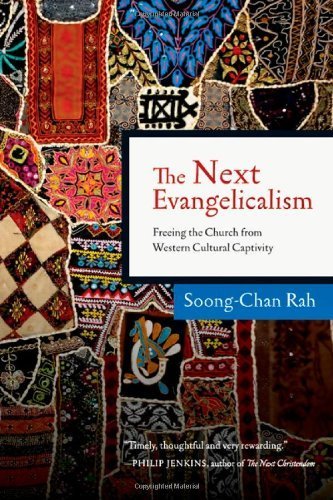
Gone Girl by Gillian Flynn – “I know. I’ll just read to the
halfway point and then go to bed like I said I would two hours ago…just to the
halfway point and then, WHA!!!!!! O MY GOSH!!! JUST ONE MORE CHAPTER.” (Note: This book would have an R-rating if it was a movie, so I'm not, like, recommending it for your church group or anything.)

On the Blog...
Most Popular Post:
“Ashamed”
Most Popular Comments:
In response to “Ashamed,” Nicole Cottrell wrote:
“Not
that it matters much, but this is my favorite thing you've ever written. Because at the end of the day, this is it. You and I could sit
across from one another with all of our (perceived) theological differences and
it wouldn't matter... Because of this and what you shared here. Because you
echo my very own heart with these words. Because Jesus binds us, our love for
Him and our hope for the rest.”
And in response to "The Bible: It's Just Not That Into You," Eric wrote...er, sang:
Altogether now:
"You're so vain,
You prob'ly think the Bible's about you,
You're so vaaaaain,
I bet you think the Bible's about you,
Don't you? Don't you?"
And don’t forget! Next week we’ll be hosting “Into the Light: A
Series on Abuse and The Church”
I had a wonderful time on my West Coast Tour…even after a very
long overnight flight home. It was such a joy to meet so many of you in person!
There were hugs, tears, lots of laughs, food (so.much.food), long talks, quick
hellos, sad goodbyes. I am so grateful for each story, each question, each new
insight, each gift.
I started at Hope International University in Fullerton, which
felt a bit like a homecoming as it was one of the first schools I visited when
I began speaking, and one of the most welcoming and hospital communities you
will meet. In Fullerton, I had the chance to grab lunch with fellow bloggers (and
friends) Elizabeth Esther and Kristen Howerton. We basically solved all of the
world’s problems in the span of two hours…(can’t explain the reasons here).
Also, it hailed. In Southern California.
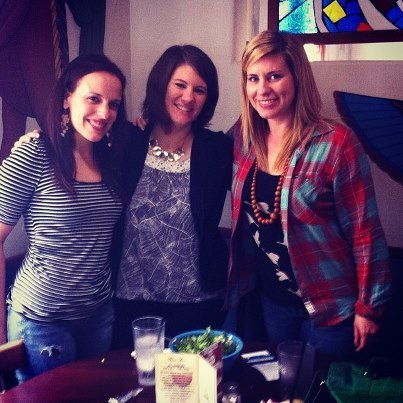
Next it was on to Azusa Pacific where I was welcomed like a
sister by women like Ariel Price and Kate Wallace. (Kate and her mom, Gail Vaughn Wallace, maintain the very
awesome Junia Project board on Pinterest, one of my favorites). I also met an
amazing woman of valor named Leslie Wickman, who is also basically a rocket
scientist. The event that evening was one of my favorites, with lots of
thoughtful, fun questions from the audience about my year of biblical
womanhood.
I spent my Saturday running around LA
with my dear friends Adam and Rachel Crownoble and their three girls. We
visited the Getty Museum on a beautiful, breezy California day and I ALMOST
understood why people like them would move there….even though it’s too far away
from me. (Miss them so much!)
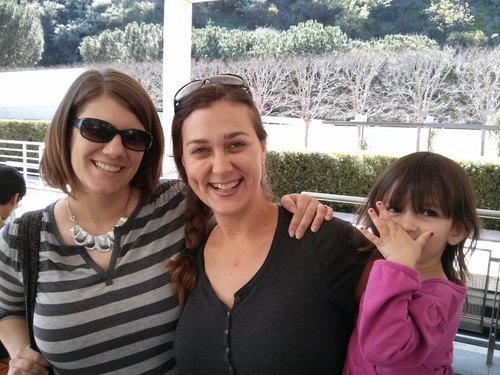
Then it was on to Portland, where I
couldn’t help but think of the Portlandia song, “The Dream of the 1890s is
Alive in Portland,” when my gracious host Andy Campell, (who homebrews his own
beer, of course) presented me with AMAZING homemade bread from his wife April and began
talking about his friends who make their own soap and, you know, pickle things.
(“We can pickle that!”) While in
Portland, I had the honor to attend the public memorial for Richard Twiss,
which was a moving and challenging experience that I will be mulling over for
months to come, and I also got the chance to hang out with the delightful Emily
Maynard.
Next it was on to George Fox Seminary
in Portland, where Roger Olson and I discussed the future of evangelicalism
with a very smart, very receptive group of students, faculty, church leaders,
and locals. (I really enjoyed Roger’s presentation – learned more about my
evangelical heritage in 20 minutes than I have in 20 years!)
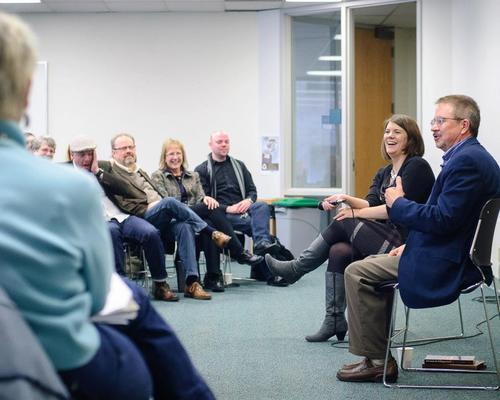
Photo by Andy Campbell
At the seminary, my
friend Bob Henry presented me with a gorgeous painting inspired by Chapter 10
of Evolving in Monkey Town. I love it when artists and musicians bring their
creativity to my writing; makes the whole process so much more collaborative.
My final stop was in Newberg, where the
students of George Fox University totally blew my mind with their intelligence,
thoughtfulness, and hospitality. Seriously. At lunch, a group of students were
asked about their thoughts on the future of Christianity and several mentioned
the importance of looking to the global South and East since the center of
Christianity seems to be shifting in that direction. Smart! I also connected with the small, but growing and gracious LGBT group on
campus.
In Newberg, I also had the privilege of
connecting with Beth Woolsey, whose life epitomizes real
hospitality. She literally built her house around a giant table! Also, she
still had her Christmas decorations up. “You can’t wait until everything is
perfect to invite people into your life,” she said. Amen.

This is just a brief overview. I met
and connected with so many more amazing people on this trip—you know who you
are! There are just too many memorable meals and conversations to include. I don’t
know if I have ever felt more humbled and grateful to get to do this work, this
work that has intersected my life with yours, if only for a brief time. I
prayed prayers of gratitude all the way home.
***
So, what caught your eye online this week? What’s happening on your blog?



March 15, 2013
The Bible: It’s Just Not That Into You

So some friends recently pointed me to the Personal Promise Bible, in which you can personalize the biblical text to include you name in over 7,000 places.
Some examples provided on the Web site:
2 Peter 1:4 – “By which He has granted to Joe His precious and exceedingly great promises; that through these Joe may become a partaker of the divine nature, having escaped from the corruption that is in the world by lust.”
Isaiah 53:4-6 “Surely He has borne Rachel's sickness, and carried her suffering; yet we considered Him plagued, struck by God, and afflicted. But He was pierced for Rachel's transgressions. He was crushed for Rachel's iniquities. The punishment that brought Rachel peace was on Him; and by His wounds Rachel is healed.”
Matthew 5:13-16 “Rachel is the salt of the earth, but if the salt has lost its flavor, with what will it be salted? It is then good for nothing, but to be cast out and trodden under the feet of men. Rachel is the light of the world. A city located on a hill can't be hidden. Neither do you light a lamp, and put it under a measuring basket, but on a stand; and it shines to all who are in the house. Even so, Rachel's light must shine before men; that they may see Rachel 's good works, and glorify her Father who is in heaven.”
Um, no.
[...Although this could provide great endorsement material for my next book: "Rachel Held Evans is the light of the world." - God]
While this product may be an extreme example, it points to the profound influence of Western individualism on our reading of the biblical text. Passages that were originally written for groups of people, and intended to be read and applied in a community setting (the nation of Israel, the various early churches, the first followers of Jesus), have been manipulated to communicate a personal, individual message…thus leading the reader away from the original corporate intent of the passage to a reaffirmation of the individualistic, me-centered, and consumerist tendencies of American religious culture.
We see this everywhere: in worship set lists that focus exclusively on individual worship, individual sin, and individual connection to God; in desk calendars that turn Jeremiah 29:11 (“For I know the plans I have for you, says the Lord…”) into a personal promise; in the disproportionate emphasis in our churches on personal Bible study, personal prayer, and one’s “personal walk with God.”
How easy it is to forget that, for most of its history, the Bible has been read, processed, and practiced in group settings! The notion of individual interpretation, in fact, is relatively new.
In The Next Evangelicalism: Freeing the Church from Western Cultural Captivity--an excellent book that we will most certainly be discussing at length in the near future—Soong Chan Rah writes:
“The American church, in taking its cues from Western, white culture, has placed at the center of its theology and ecclesiology the primacy of the individual. The cultural captivity of the church has meant that the church is more likely to reflect the individualism of Western philosophy than the value of community found in Scripture. The individualist philosophy that has shaped Western society and consequently shaped the American church reduces Christian faith to a personal, private, and individual faith…”
Rah observes how this captivity has affected our reading of the Bible:
“If we were to pay attention to the intended audience of the various books of the Bible, we would find that only a handful of books were actually written exclusively to individuals—such as 2 Timothy, Titus, Philemon. An overwhelming number of books in the Bible are written to communities: the people of God, the nation of Israel, the church in Colosse and Corinth, the seven churches in Asia Minor, etc. Yet why is that our reading of the text centers so much on the individual reading of Scripture versus a corporate reading as the overwhelming majority of Scriptures demand? In a typical American church, are we taking teaching intended for the community of faith and reducing it to an application exclusively on an individual level?”
This is not to say that the Bible cannot speak to us personally—it often does. (Many of the Psalms are quite personal.) But, ultimately, the Bible is meant to be read, interpreted, digested, discussed, and practiced in the context of community. And the theological implications of an exclusively individualistic faith rather than a corporate faith are astounding. There is a huge difference, after all, between claiming He has “borne our sickness, and carried our suffering….was pierced for our transgressions” and claiming He has borne “MY sickness, and carried MY suffering…was pierced for MY transgressions.” Such a reading renders the reconciling work of God into little more than a personal improvement project, with the individual at the center, rather than the sustained and relentless work of God to reconcile and redeem the whole world.
I hate to break it to the creators of the Personal Promise Bible, but the Bible just isn’t that into you.
It's got a lot more to say about us.
***
[...Not to mention all the confusion that arises when instructions directed toward a very specific group - Israel, for example, or the Corinthian church - are applied to an individual. How much you want to bet that the Personal Promise Bible renders 1 Timothy 2:12 into "I do not permit Rachel to have authority over a man," but renders 1 Corinthians 11:6 into, "For if a woman does not cover her head, she might as well have her hair cut off"?]
***
In what other ways do you observe this tendency to individualize the Christian faith and the gospel?



March 13, 2013
Into the Light: A Series on Abuse and the Church

“For you were once darkness, but now you are light in the Lord. Live as children of light…and find out what pleases the Lord. Have nothing to do with the fruitless deeds of darkness, but rather expose them…Everything exposed by the light becomes visible—and everything that is illuminated becomes a light.” (Ephesians 5:8-13)
I’ve been wanting to do a series on abuse awareness for a while now, and since the news surrounding the Sovereign Grace Ministries lawsuit has brought the issue to the forefront, I thought it would be wise to seize the moment to talk about how Christians can better respond to abuse and abuse survivors.
Pastor Tim Challies has argued that “thinking biblically” about the SGM lawsuit—which alleges that the leadership of SGM covered up the abuse of children by discouraging parents from reporting abuse to authorities and requiring victims to forgive their abusers in person— means keeping quiet about it in order to avoid “gossip.” He encouraged his readers not to ask too many questions about the situation, and to give SGM leadership the benefit of the doubt. Even after SGM has appealed to the First Amendment to avoid an investigation into the matter, Challies and many evangelical leaders with ties to SGM (including Al Mohler, John Piper, and the Gospel Coalition) have either remained silent about the lawsuit or defended SGM, often characterizing those who have come forward with concerns about abuse as “divisive" or "sowing disunity and strife" in the Church.
This response to the SGM lawsuit speaks volumes about some of the harmful narratives that tend to emerge in Christian circles around abuse, narratives I’ve only recently learned to identify with the help of abuse survivors. Thinking “biblically” (…or perhaps, more accurately, thinking Christianly…) about abuse doesn’t mean keeping abuse in the shadows or shaming those who would come forward as troublemakers. Thinking Christianly about abuse means bringing it to light, confronting it as evil, rallying around the exploited and marginalized, and calling out the powerful. And it means listening to the stories of survivors, identifying our blind spots, learning from our mistakes, and vowing to do everything in our power to make our churches and faith communities safer places to worship and grow together.
So in this spirit, I am pleased to announce that next week I’ll be hosting a series of posts on the topic of abuse. For the series, I’ve enlisted the help of professional counselors, lawyers, abuse survivors, church leaders, and advocates, from a variety of backgrounds and areas of expertise. The series is meant to be instructive, not merely a critique, and a combination of powerful storytelling and practical advice. (Boz Tchividjian of G.R.A.C.E. has graciously agreed to an interview, and folks like Mary DeMuth, Elizabeth Esther, and Sarah Moon will be sharing their stories.) We will touch on sexual abuse and violence, child abuse, domestic violence, spiritual abuse, and bullying.
In addition, my friends Hannah, Joy, Shaney, and Elora will be hosting a spiritual abuse awareness synchroblog, which you can learn more about here.
I hope you will participate. There’s no way we can cover every angle of this important issue in a week, so your comments, questions, and posts will be critical in bringing more depth and insight to the conversation.
As we prepare, what are some pitfalls to avoid? What angles are most important to hit? And do you have suggestions for resources I can share?
[Note: I’ll be speaking/ travelling for the next 24 hours, so if I don’t respond to your comment, it’s because I’m stuck in an airplane.]



March 8, 2013
Happy International Women’s Day, Women of Valor!
Laxmi
I think of Laxmi, a widow from Hyderabad, India, who rises
before dawn each day to sweep floors and grill chapatis and kiss the bruises
and bumps of more than twenty children who, like she, have been affected by
HIV/AIDS. Eshet chayil—woman of valor!
I think of Elena, a mother of five from rural Bolivia, who
in spite of her own poverty and her husband’s illness, opened her home to an
abandoned little girl and officially adopted her. Eshet chayil—woman of valor!
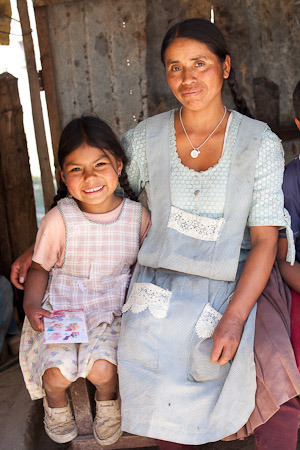
Elena (Photo by Amy Conner, World Vision)
I think of my mother, Robin, the best fourth grade teacher
in the world, who manages to make every child feel extraordinary and who always
seeks out the ones with the most to overcome and loves them like her own. Eshet
chayil—woman of valor!
I think of Amanda, the little sister I look up to, who
brings compassion and humor and joy to every space she occupies, and who embodies
better than anyone I know what it means to love your neighbor, no matter who
that neighbor may be. Eshet chayil—woman of valor!

Amanda
I think of my friends Sara Barton and Jackie Roese, who have
endured vicious insults and angry dissent for daring to stand behind a pulpit
and declare the good news that Christ has died, Christ has risen, and Christ
will come again. Eshet chayil—women of valor!
I think of all the young women who approach me after a
lecture or sermon to say they are studying to be leaders in the church, that
it’s hard sometimes, but that they’re not giving up. Eshet chayil—women of valor!
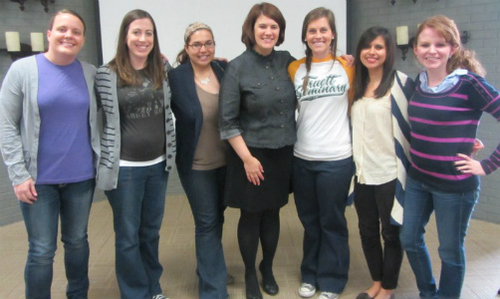
I think of my friend Monika, who knows how to take the
broken fragments of an ugly world and, somehow, piece them together into art.
Eshet chayil—woman of valor!
I think of Ahava, who all the way from Israel, taught me to
make challah and sound a shofar and read Proverbs 31 like it was intended to be
read. Eshet chayil—woman of valor!
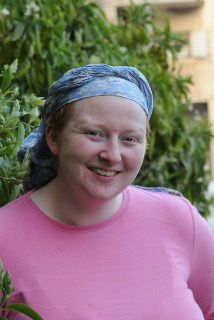
Ahava
I think of Elora and Mary and all the women who bravely tell
their stories so that other women might heal. Eshet chayil—women of valor!
I think of Leymah
Gbowee, who rallied her sisters to peacefully end a civil war. Eshet chayil—woman
of valor!
I
think of all the women struggling to survive, working to
make ends meet, pursing justice, loving mercy, walking humbly with God, and bringing healing and beauty to the world one
small act of faithfulness at a time.
And I
celebrate them today.
Eshet
chayil—women of valor.
**
So, what woman of valor do you want to celebrate today? (To learn more about eshet chayil, check out A Year of
Biblical Womanhood.)
Contest will run through Saturday, March 9 at 11:59 p.m. If you want to enter, be sure to sign in to DISQUS so I can track down your email address and contact you if you win. Results will be chosen by random.org.
You might also like our Women of Valor series.



March 7, 2013
Ashamed
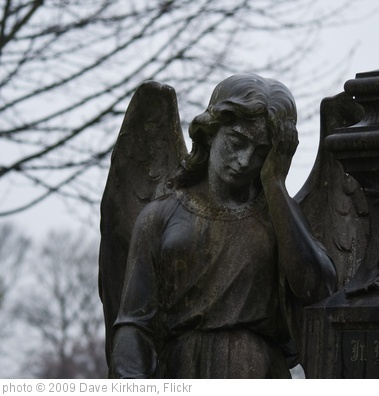
I am ashamed.
I am ashamed that we feast while our neighbors go hungry.
I am ashamed of our selective memory.
I am ashamed of the bumper stickers, the t-shirts, the
logos, the fog machines, the light shows, the celebrities, and that paralyzing
fear of Silence we’re so bound and determined to avoid that we keep shouting
and shouting and shouting at one another till our words are just clanging
cymbals echoing off church walls.
I am ashamed of the walls. They are built high, with circles
of barbed wire around the top, to keep pests away from our bread and wine, to
keep the Silence from getting in.
I am ashamed of the abuse, the shaming, the cover-ups, the
secrets, the millstones being forged in Sunday school classrooms and pastors’ offices
where people are supposed to be safe, and the way I want to watch those
millstones drag a few more bodies down to the bottom of the sea.
I am ashamed of the violence—in our theology, in our words,
in myself.
I am ashamed of how we have confused two kingdoms—demanding
God’s name on Caesar’s coins, invoking God’s will in our wars, reducing God’s Word
to against or for. We’ve turned the Bible into a position paper.
I am ashamed of our mindless routines: segregated Sunday
mornings, men up front and women in the back, the Romans Road and the Sinner’s
Payer, “what were you wearing to make him say/think/do that?” the relentless chase
after the American dream.
I am ashamed of mission trips that hurt more than help, of
hijacked stories and imagined heroics, of our industrial savior complex, and
most of all, my own stubborn complicity in the very injustices I decry. There
is “slavery stitched into the fabric of my clothes” but I’ve learned to ignore
the itch.
I am ashamed that the Church has become the scariest place
to come out instead of the safest, that it
routinely shuts out the most vulnerable, the most hurting, the most
despised, when those were the people Jesus started with, the people he loved
most.
I am ashamed that we are so quick to speak and so slow to
listen.
I am ashamed by our lack of imagination, ashamed by our
hypocrisy, ashamed by the heavy loads we bind up to place on people’s backs,
ashamed by the logs in our eyes and the stones in our hands.
I am ashamed by our failure to love.
I am ashamed of the way I judge those I deem judgmental, the
way I stumble through my day without prayer, the way I issue praises to heaven in one breath and
curse my brothers in the next, the way I talk a big game about loving others
and then brush past the woman crying in the airport, the way cynicism seeps into
my bones, the way I zone out in front of my wireless glowing mirror in a
pathetic effort to avoid confronting it all.
Who’s the fairest?.
I am ashamed, and I am sorry.
But I am not ashamed of the gospel.
I am not ashamed of this scandalous news, whispered first by
a pregnant Palestinian teenager whose dream for the world shattered the proud
and lifted up the humble.
I am not ashamed of the carpenter anointed to restore sight
to the blind and set prisoners free, or his ragamuffin band of fishermen and tax collectors and zealots, his friendship with prostitutes, his strange ways
and long stories, his challenge to the religious, his radical notion that women
are human.
I am not ashamed of the good news that we have it backwards:
Privileged are the poor, the peacemakers, the merciful, and the suffering. Cursed
are the rich, the full, the merciless, the hateful.
I am not ashamed that when God strapped on sandals and
walked among us, God fed the hungry, wept with the mourning, touched the
untouchable, turned water into wine, cracked jokes about religion, obeyed his
mom, defended the defenseless, bantered with children, forgave his enemies, and
reminded us that the whole point of it all is to love God and love our
neighbors well. That's it.
I am not ashamed that when God strapped on sandals and
walked among us, God rode a donkey instead of a war horse.
I am not ashamed of the good news that we don’t have to wait
around for the right leader or the right government because there’s a new and
better kingdom growing in us and around us, a kingdom that welcomes all to the
table.
I am not ashamed of the good news that Jesus is Lord and
Caesar is not.
And I am not ashamed of the very good news that when God
strapped on sandals and walked among us and endured the very worst this world
has to offer, the very ugliest inside of us, God looked upon it all and said,
“Father forgive them, for they know not what they do.”
And I am not ashamed of the very good news, first shouted by
another unlikely woman in another garden,
and then echoed through the centuries in every corner of the earth, that Jesus Christ
has risen from the dead! Risen indeed, we say, even when we're not quite sure we believe it.
I am not ashamed of this great cloud of witnesses, kicking
up dust ahead of me on the path. They are hermits and homemakers and sinners
and saints and pilgrims and poets and mothers and activists and peacemakers and
friends. They bind up wounds and stand up to bullies and offer rides and listen
well and make meals and let things go and work hard and fail sometimes. But
they keep telling the story—this story that sets both the oppressed and the
oppressors free, this story that may even save me.
I am not ashamed of love. Love casts out fear; love knits us
together; love conquers all.
I am not ashamed of the Church. She is a survivor, after
all, a work-in-progress, a stubborn bride-to-be. The gates of hell will not
prevail against her, they say. So I guess I better quit hedging my bets.
I am not ashamed because there are all these little mustards
seeds scattered across our broken, shameful world, some of them just now
swelling and splitting underneath the dark soil; others breaking through the
surface with a garish flash of green; others meandering toward the sun, desperate
for light or rain or some sort of trellis; others growing slow and steady into
tall shade tress with limbs like arms wide open to the world, welcoming the
birds of the air to nest in their branches.
I am not ashamed because my roots are deep and the sky is
tall, and there will always be some place to grow.
I am not ashamed because I am not alone.



March 6, 2013
Updated: Azusa Pacific Event



March 5, 2013
See you in Fullerton, Azusa, Portland, or Newberg…? (West Coast Schedule)
It’s cold and rainy here in East Tennessee. Seems like the
perfect time for a trip to the West Coast! Copied below is my schedule ,
including the topics of my presentations, as well as links for more
information. All events are open to the
public.
If you attend, please be sure to stop and say hello. I love
meeting readers in person! I won’t be selling books on this trip, so if you
want a copy signed, you may want to purchase it ahead of time.
Thursday, March 7
Hope International University
Fullerton, CA
9:30-10:30 a.m.
Chapel
“My Year of Biblical Womanhood”
Pacific Auditorium
Friday,
March 8
Azusa Pacific University
Azusa, CA
7:00-9:00
p.m.
Lecture, Reading, Q&A
“My Year of Biblical Womanhood”
Monday,
March 11
George Fox Seminary
Portland, Oregon
9:00
a.m. – 12:00 p.m.
Ministry
in Contemporary Culture Series
“Does Evangelicalism Have a Future?" with Roger Olson
Room 155
More
info - must register
Tuesday, March 12
George Fox University
Newberg, Oregon
9:00 p.m. – 10:00 p.m.
Shalom Chapel
“Thick Skin & Tender Hearts: Making Peace with Critics”
Wednesday, March 13
George Fox University
Newberg, Oregon
10:40-11:30 a.m.
Chapel
“My Year of Biblical Womanhood”
Bauman Auditorium
Let me know if you have any questions or if I can expect to see you at one of these events.
Also, travel usually means inconsistent or nonexistent posting...so thanks for your patience. :-)



"Washed and Waiting," Chapter 1: Celibacy and the Gospel Story
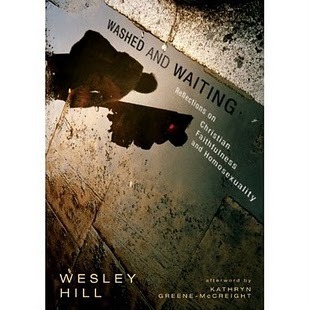
Today we continue our discussions of Wesley Hill’s book,
Washed and Waiting: Reflections on Christian Faithfulness and Homosexuality, as
part of our yearlong series on sexuality and the Church.
Wesley’s book is meant to
both complement and contrast Justin Lee’s book, Torn: Rescuing the Gospel From the Gays-vs-Christians
Debate, which served as a starting point for our discussion.
Both Justin and Wesley are gay, but whereas Justin concluded that a
relationship with another man could be blessed by God, Wesley has chosen
celibacy. I picked these two books because I think Justin and Wesley
represent the very best in civil, gracious, and loving disagreement on this
issue…which for them is not a mere issue, but a deeply personal journey with
deeply personal implications.
To catch up on our discussion, check out our Sexuality and the Church category.
A
Story-Shaped Life
In
Chapter 1, Wesley explains why he believes scriptural witness and church
tradition require him not to act on his homosexual desires and how the gospel
enables him to fulfill this demand.
He
begins by briefly addressing some of the same biblical passages we addressed in
our discussion of Torn—Leviticus 18:22; Genesis 19:1-11; 1 Corinthians 6:9-10;
I Timothy 1:8-11; Romans 1:18-32—as well as Genesis 1-3 and Jesus’ teachings on
divorce in Matthew 19:3-9 and Mark 10:6-8, which Wesley says “presents marriage
between one man and one woman as the God-given context for human sexual
expression and thus, in principle, rules out homosexual practice.”
“On
the basis of texts such as these,” Wesley concludes, “the Christian church has
consistently and repeatedly said no to homosexual practice.” (p. 53)
Wesley
doesn’t gloss over the challenge of this conviction .
“To
say no over and over again to some of my deepest, strongest, most recurrent
longings often seems, by turns, impossible and completely undesirable. If a gay
Christian’s sexual orientation is so fixed and ingrained that there seems to be
little hope of changing it, should he or she really be expected to resist it
for a lifetime?”
After
all, Wesley notes, Genesis 2:18 says it is not good for man to be alone, the
apostle Paul writes that it is better to be married than to burn with passion,
and Jesus warned against religious leaders tying up “heavy burdens, hard to
bear,” and laying them on people’s shoulders (Matthew 11:30).
But
Wesley concludes: “In the end, what keeps me on the path I’ve chosen is not so
much individual proof texts from Scripture or the sheer weight of the church’s
traditional teaching against homosexual practice. Instead, it is, I think,
those texts and traditions and teachings as I see them from within the true
story of what God has done in Jesus Christ—and the whole perspective on life
and the world that flows from that story, as expressed definitively in
Scripture.” (61)
Wesley
identifies six streams of this narrative that give him a context in which he
can see how his commitment to celibacy makes sense.
Forgiveness
The
first, he says, is the fact that “the Christian story promises the forgiveness
of sins—including homosexual acts—to anyone who will receive it through Jesus’
death and resurrection.” (p. 62)
“Christianity’s
good news provides—amply so—for the forgiveness of sins and the wiping away of
guilt and the removal of any and all divine wrath through the death and
resurrection of Jesus Christ from the dead,” he says. “Seen in this light, the
demand that we say no to our homosexual impulses need not seem impossible. If
we have failed in the past, we can receive grace—a clean slate, a fresh start.
If we faith today or tomorrow in our struggle to be faithful to God’s commands,
that, too, may be forgiven.” (64)
The
Demands of God
The
second element of the gospel story that Wesley says puts his celibacy in
perspective is a God who is “known by his threat to our going on with ‘business
and usual.’”
“Far
from being a tolerant grandfather rocking in his chair somewhere far away in
the sky, God most often seems dangerous, demanding, and ruthless as he makes
clear that he is taking our homoerotic feelings and actions with the utmost
seriousness.” (67)
Wesley
says this is true for all Christians, whatever their sexual orientation, who to
one degree or another, “experience the same frustration [Wesley does] as God
challenges, threatens, endangers, and transform all of our natural desires and
affections.” (65)
“Engaging
with God and entering the transformative life of the church does not mean we
get a kind of ‘free pass,’ an unconditional love that leaves us where we are,”
writes Wesley. “Instead, we get a fiercely demanding love, a divine love that
will never let us escape from its purifying, renovating, and ultimately healing
grip. And this means that our pain—the pain of having our deeply ingrained
inclinations and desires blocked and confronted by God’s demand for purity in
the gospel—far from being a sign of our failure to live the life God wants, may
actually be the mark of our faithfulness.” (68)
The
Corporate, Communal Body of Christ
“The
Christian story proclaims that our bodies belong to God and have become members
of the corporate, communal body of Christ,” writes Wesley. “This is yet a third
reason Scripture and the church’s no to homosexual practice makes sense to me.”
(68)
Wesley
argues that, from the gospel’s point of view, there is no absolute right or
unconditional guarantee of sexual fulfillment for Christians.
So
“if all Christians must surrender their bodies to God in Christ whenever they
enter the fellowship of Christ’s body,” he concludes, “”then it should come as
no great shock that God might actually make demands of those Christians and
their bodies—demands proving that God, and God alone, has authority over us.”
(70)
Fellowship
in Christ’s Suffering
Finally,
Wesley points to the long-suffering and endurance of celibate Christians as a
participation in the suffering of Christ.
“One
of the hardest-to-swallow, most countercultural, counterintuitive implications
of the gospel is that bearing up under a difficult burden with patient
perseverance is a good thing,” write Wesley. “The gospel actually advocates
this kind of endurance as a daily ‘dying’ for and with Jesus. While those in
the grip of Christ’s love will never experience ultimate defeat, there is a
profound sense in which we must face our struggles now knowing there may be no
real relief this side of God’s new creation.”
One
way Wesley says he has received help in dealing with his particular struggle
has been through reading about the unfulfilled desires of others and how they
have dealt with them. He has drawn particular inspiration from Henri Nouwen and
Gerard Manley Hopkins in this regard. He also quotes from stories from C.S.
Lewis and Wednell Berry, and from W.H. Auden. (This lit major has sure enjoyed
his literary references throughout the book!)
Jesus
– fully human, celibate
Wesley
makes one more point at the end of this chapter that I actually found more
intriguing than any of the others.
“Woven
into the fabric of Christian theology,” he writes, “is the insistence that
Jesus Christ is the truest, most perfect, most glorious human being who has
ever lived,” and all the evidence suggests that Jesus lived as a sexual
celibate.
“It
may come as a surprise in our age of personal gratification that Jesus never
married and never had sex—with a woman or with a man,” writes Wesley. “And yet
he was the truest, fullest human being who has ever lived.” (77)
This
doesn’t mean that everyone who wants to share the true humanity of Jesus must
be celibate, he says. But it does “shift the terms of our modern thinking about
sexuality. It dislodges our assumption that having sex is necessary to be
truly, fully alive. If Jesus abstained and he is the measure of what counts as
true humanity, then I may also abstain too—and trust that, in so doing, I will
not ultimately lose.” (77)
Reflections
Once
again, I am impressed by Wesley’s depth, thoughtfulness, and honesty as he
shares his story, and I am personally challenged by his commitment to follow
Christ, no matter what. His point about Jesus makes a lot of sense to me, and
it forced me to confront a patronizing sense of pity, perhaps even condescension,
I have for Christians who have, for whatever reason, chosen celibacy. Wesley’s
right. Our sense that an active sex life is required for a fulfilled life is
indeed misguided and should be confronted.
Those who have chosen celibacy—for whatever reason— can teach us some
important, critical things about self-denial and discipline. They should be
celebrated, honored, esteemed, and included in our faith communities, not with
pity, but with admiration and friendship.
However, I’m still reeling a bit from my reading of The Civil War as a Theological Crisis, and
so I can’t help but note that it’s one thing to choose suffering for oneself,
and quite another to require it of others. Is it right for the church to demand
that all of our LGBT brothers and sisters choose celibacy? Might that be “tying
up heavy burdens, hard to bear,” and laying them others’ shoulders?
Questions
for Discussion
1.
What did you learn from Wesley’s observations
about the story of the Gospel? How might they be applicable to your life?
2.
Do you think sex is a requirement for a
fulfilled life? What about romantic companionship? What about community? (Note: I don’t want to reduce any partnership—same-sex
or otherwise—to sex, but it’s worth discussing whether a romantic partnership
is necessary for fulfillment in life.)
3.
Do you think it’s possible to respect and honor Wesley’s
decision to remain celibate while also respecting and honoring Justin’s
decision to remain open to a same-sex relationship? Can those of us who have
not had to make this difficult decision affirm both, or does support of one somehow
diminish the other?
I’ll be monitoring the comment section closely to ensure that
things remain civil. I’ll plan to shut down the thread after about 36 hours.
Thanks for weighing in!
To catch up on our discussion, check out our Sexuality and the Church category.



Rachel Held Evans's Blog
- Rachel Held Evans's profile
- 1710 followers



